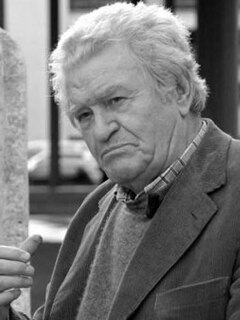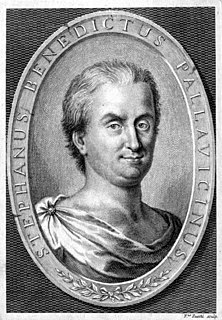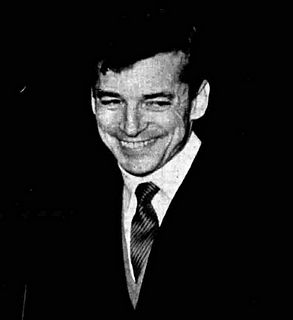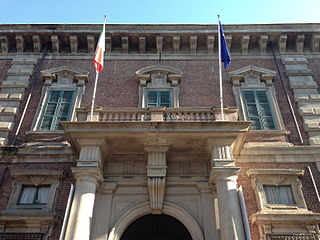Related Research Articles

The Pazzi were a noble Florentine family. Their main trade during the fifteenth century was banking. In the aftermath of the Pazzi conspiracy in 1478, members of the family were banished from Florence and their property was confiscated; the family name and coat-of-arms were permanently suppressed by order of the Signoria.

Pietro Cascella was an Italian sculptor. His principal work consisted of large monumental sculptures, including the International Monument to the Victims of Fascism in the Auschwitz II-Birkenau death camp in Poland (1957–1967), and an underground mausoleum for Silvio Berlusconi at his villa in Arcore in the 1980s.

The Foscari were an ancient Venetian patrician family, which reached its peak in the 14th–15th centuries, culminating in the dogeship of Francesco Foscari (1423–1457).
In classical scholarship, the editio princeps of a work is the first printed edition of the work, that previously had existed only in manuscripts, which could be circulated only after being copied by hand.

Stefano Benedetto Pallavicino was an Italian poet and opera librettist. He was the son of the composer Carlo Pallavicino (1630?-1688).

Piero Bellugi was an Italian orchestral conductor.

The Accademia di Belle Arti di Brera, also known as the Accademia di Brera or Brera Academy, is a state-run tertiary public academy of fine arts in Milan, Italy. It shares its history, and its main building, with the Pinacoteca di Brera, Milan's main public museum for art. In 2010 an agreement was signed to move the accademia to a former military barracks, the Caserma Magenta in via Mascheroni. In 2018 it was announced that Caserma Magenta was no longer a viable option, with the former railway yard in Via Farini now under consideration as a potential venue for the campus extension.
This is a list of words, terms, concepts, and slogans in the Italian language and Latin language which were specifically used in Fascist Italian monarchy and Italian Social Republic.

Alberto Beneduce was an Italian politician, scholar and financier, who was among the founders of many significant state-run finance institutions in Italy.
Giovanni Pellegrini was an Italian architect.
Andrea Della Corte was an Italian musicologist and critic. Born in Naples on 5 April 1883, Della Corte studied law at the University of the native city, but was self-taught in music. After some short experiences in Neapolitan papers, he moved to Turin, where he was music critic for La Stampa from 1919 to May 1967. He brought the music journalism in Italy to a level of «professionalism hitherto unknown». In Turin, Della Corte also taught history of music, both at the Conservatory (1926–53) and at the University (1939–53).
Alberto Basso is an Italian musicologist and librarian.
Dexia Crediop S.p.A. is an Italian bank specializing in financing public infrastructure. It was part of Dexia Group, as the owner of 70% shares. Banco Popolare, Banca Popolare di Milano and Banca Popolare dell'Emilia Romagna owned 10% each as minority shareholders.

The Battle of Capo d'Orso, sometimes known as the Battle of Cava and the Battle of Amalfi was a naval engagement taking place over two days, on April 28 and April 29, 1528. A French fleet inflicted a crushing defeat on the fleet of the Kingdom of Naples under Spanish control in the Gulf of Salerno, where the Spanish forces sailing southwards from their naval station in Naples trying to break the French blockade of the city met the French fleet.

The Barozzi were an aristocratic Venetian family. Members of the family became sailors, clerics and men of learning. They were lords of Santorini and Thirassia, and held military fiefs on the island of Crete. Members of the family were involved in the conspiracy of Bajamonte Tiepolo against the Doge of Venice in 1310.

The Premio Mylius was an Italian prize for painting. It was established by the Austrian industrialist Heinrich Mylius in 1841 and awarded by the Accademia di Brera in Milan, which at that time was under Habsburg rule. In 1856 there were two types of award, an annual prize of 700 Austrian lire for a painting in oils, and a biennial award of 1000 lire for fresco work. It was awarded until the outbreak of the Second World War.

Alessandro Casati was an Italian academic, commentator and politician. He served as a senator between 1923 and 1924 and again between 1948 and 1953. He also held ministerial office, most recently as Minister of War for slightly more than twelve months during 1944/45, serving under "Presidente del Consiglio" Bonomi.

Giuseppe Bencivenni Pelli or Giuseppe Pelli Bencivenni was an Italian civil servant and essayist. Born and dying in Florence, he served as director of the Uffizi Gallery from 1775 to 1793. He was the last member of a Florentine patrician family.
Zaccaria Betti was an Italian poet, writing about agricultural topics.

Antonio Veretti was an Italian composer.
References
- 1 2 3 4 5 6 [s.n.] (2010). Opera nazionale combattenti (in Italian). Dizionario di Storia. Roma: Istituto dell’Enciclopedia Italiana. Accessed December 2017.
- 1 2 Bonelli, Franco (1966). "Beneduce, Alberto". Dizionario Biografico degli Italiani, Volume 8: Bellucci–Beregan (in Italian). Rome: Istituto dell'Enciclopedia Italiana.